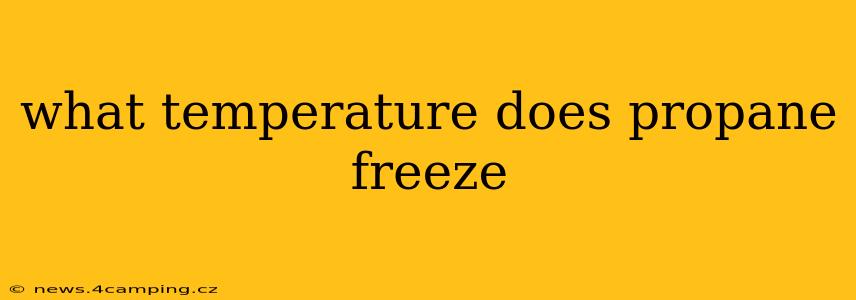Propane, a widely used fuel source for everything from grills to home heating systems, boasts impressive cold-weather performance. But how cold can it get before propane freezes? The short answer is significantly colder than most people experience. Let's delve into the specifics and address some common questions.
What is the Freezing Point of Propane?
Propane's freezing point, or more accurately its melting point since we're talking about a solid transitioning to a liquid, is -187.7°C (-305.9°F). This extremely low temperature means that propane remains a liquid and usable in incredibly cold climates. Unless you live in an exceptionally frigid environment like Antarctica, you're unlikely to experience temperatures anywhere near propane's freezing point.
Does Propane Freeze in Winter?
No, propane does not typically freeze during normal winter conditions. Even in the coldest regions of North America, Europe, or Asia, temperatures rarely drop to -187.7°C (-305.9°F). The extreme cold needed to freeze propane is far below what is experienced even in the harshest winters.
What Happens to Propane at Very Low Temperatures?
While propane won't freeze in typical winter weather, its behavior does change at very low temperatures. The primary effect is a reduction in vapor pressure. This means less propane vaporizes, potentially impacting the efficiency of appliances that rely on propane vapor. However, this doesn't mean the propane itself becomes unusable; it just means it might require more energy to vaporize and deliver fuel.
Can Cold Weather Affect Propane Tank Pressure?
Yes, cold weather can affect the pressure inside a propane tank. Lower temperatures cause the propane to contract, resulting in lower tank pressure. This is normal and doesn't indicate a problem with the propane itself. However, it can impact the flow rate of propane to your appliances.
How Cold Does it Have to Be to Affect Propane Use?
It takes exceptionally frigid temperatures to significantly hinder propane usage. While decreased vapor pressure at lower temperatures can slightly reduce efficiency, it's generally not a major concern for most users. Unless temperatures plummet well below -40°F (-40°C), you are unlikely to experience any substantial issues with your propane appliances.
How Can I Ensure My Propane System Performs in Cold Weather?
While propane itself is highly resistant to freezing, taking a few precautions can enhance your propane system's performance in cold weather:
- Keep your tank full: A fuller tank minimizes the potential for pressure drops due to temperature fluctuations.
- Protect your tank from extreme cold: Consider insulating your propane tank, especially if it's exposed to wind and direct cold.
- Regular maintenance: Regular checks of your propane system, including lines and appliances, can help identify potential problems before they occur.
- Choose a properly sized tank and regulator: Ensure your propane system is appropriately sized for your needs. A poorly matched system might experience greater efficiency drops in cold weather.
In conclusion, the freezing point of propane is far below any temperature encountered in everyday life. While very cold temperatures can slightly affect its vapor pressure and overall efficiency, it remains a reliable and safe fuel source even in harsh winter conditions with proper care and maintenance.
